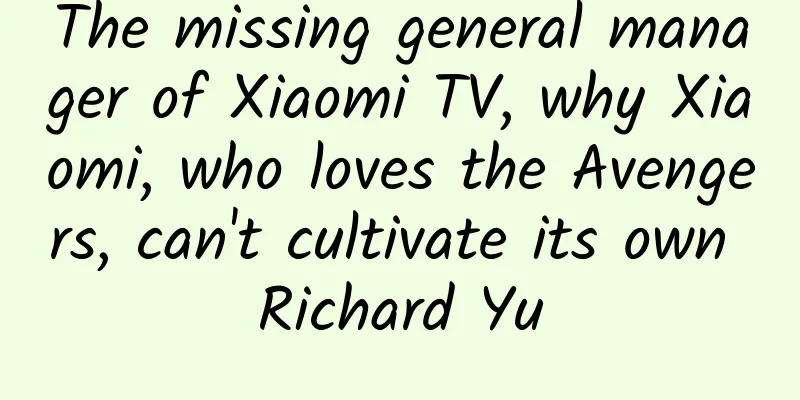The missing general manager of Xiaomi TV, why Xiaomi, who loves the Avengers, can't cultivate its own Richard Yu

|
Xiaomi TV has hit a growth ceiling, and its general manager has been missing for nearly five months. In September 2013, Xiaomi released its first Mi TV. Just six years later, with its ultra-low price, Xiaomi became the first brand in the Chinese color TV market to have annual shipments of over 10 million. After several years, when the online bonus was exhausted and the overseas market was limited to India, Xiaomi TV turned its attention to the traditional offline market. Liu Yaoping, former vice president of Skyworth TV and general manager of Baofeng TV, who was good at developing offline markets, came to Xiaomi TV. On May 9 this year, Xiaomi's "Avengers" were officially announced, with Liu Yaoping being "airdropped" as general manager of the TV department, and the former general manager Li Xiaoshuang being transferred to be responsible for the home appliance department. But soon after he took office, rumors spread in the industry that Liu Yaoping was taken away by relevant departments to assist in the investigation. Judging from his Weibo, Liu Yaoping has not appeared in public since joining Xiaomi. His last Weibo post was on May 13. This is in stark contrast to the promotional pace of other Xiaomi executives who post several Weibo posts on average every day. In contrast, Li Xiaoshuang, who was transferred to the large appliance department, continues to speak out for Xiaomi TV on Weibo. At present, there is still no relevant report on Liu Yaoping being taken away for investigation on the Internet. The industry speculates that it is likely related to the Baofeng Group case. In 2019, Feng Xin, the actual controller of Baofeng Group, was taken into custody for suspected bribery of non-state employees and was formally prosecuted in court in July 2020. For Xiaomi TV, which is at a critical juncture, the incident with the new head Liu Yaoping as soon as he took office was obviously a bit unprepared. And because Xiaomi always loves senior executives from friendly companies and likes "paratroopers", when the senior executives in charge of specific affairs suddenly "disappear", the original deployment will inevitably be disrupted, and the original cadres will not be able to fill in in time. There are reports that the position of Xiaomi TV general manager was not filled until recently, and it was vacant for several months. If Xiaomi had sufficient ability to train senior executives, things might not have ended up like this. The competitive Rashomon of "Magneto" From Lu Weibing, President of Gionee, who joined Xiaomi in early January 2019, to Miao Lei, former Vice President of Nubia, who joined at the end of the year, to Chang Cheng, former head of Lenovo's mobile phone business, and Wang Xiaoyan, founder of Xiaomi Mobile, who joined in January 2020, to Yang Zhe, former senior vice president of Meizu, and Liu Yaoping, former CEO of Baofeng TV, who were recruited in May, Xiaomi has gone further and further on the road of parachuting in executives, but there are very few executives who have been promoted from the Xiaomi system. Without exception, these executives from friendly companies have witnessed the defeat of their former employers in the market, and therefore are nicknamed the "Avengers" by netizens. The addition of the "Avengers" has indeed broadened Xiaomi's vision and practical capabilities. For example, under the leadership of Lu Weibing, the Redmi brand has successfully shouldered the heavy responsibility of "extreme cost-effectiveness", allowing the Xiaomi brand to fully impact the mid-to-high-end market. Chang Cheng, who is called "Magneto" by netizens, has brought more topics to Xiaomi, making the new phone appear on the "hot list" many times. However, "airborne executives" still carry great risks and can backfire if not handled with care. Recently, the non-compete agreement dispute between Chang Cheng and his former employer Lenovo has attracted widespread attention in the industry. Chang Cheng announced his resignation from Lenovo on December 31, 2019. Lenovo China's official response stated that Chang Cheng resigned due to personal and family reasons. Both parties said goodbye to each other and parted peacefully in a peaceful and friendly atmosphere. However, what made the story take a sharp turn was that just two days later, Chang Cheng announced in a high-profile manner that he had joined Xiaomi as the vice president of Xiaomi Group and began to "work hard for his dream." At that time, some people questioned that as a senior executive of Lenovo, Chang Cheng must have access to a lot of Lenovo's core information. How could he directly jump into a competing company as an executive without the restrictions of a non-compete agreement? Sure enough, Lenovo immediately responded that the company had signed non-compete agreements with all its executives and "will seek a solution to the problem within the legal framework." At that time, Xiaomi was not at all panicked and stated to the public: "There is no non-compete clause and no non-compete compensation was received." However, in June 2020, Lenovo Group formally filed for arbitration regarding Chang Cheng's violation of the non-competition clause. The non-competition agreement existed and the non-competition compensation had been paid before Chang Cheng left. Chang Cheng insisted that the signature on the non-competition agreement was not his own, so the arbitration committee appointed the China University of Political Science and Law Courts Science and Technology Appraisal Institute to appraise the "Lenovo Restrictive Agreement" signed by Chang Cheng on July 24, 2017. The appraisal conclusion showed that the document was signed by Chang Cheng himself. On October 9, the Beijing Haidian District Labor and Personnel Dispute Arbitration Committee ruled that Chang Cheng violated the non-competition agreement and must continue to perform his non-competition obligations, pay liquidated damages of 52.52821 million yuan, and return the non-competition compensation previously paid by Lenovo. It also stipulated that Chang Cheng must continue to perform his non-competition obligations and leave Xiaomi Group, which is also in the mobile phone industry. On the same day, Chang Cheng was dissatisfied with the judgment and entrusted a law firm to appeal. The above judgment will not be executed temporarily according to law. Judging from the current situation, Chang Cheng obviously hopes to prevent himself from being eliminated from Xiaomi by delaying the execution of the judgment. But now that Chang Cheng has received the compensation, he has refused to implement the non-compete agreement and even tried to lie to deny that he had signed the non-compete agreement, which has caused netizens to question Chang Cheng's personal character. In addition, Chang Cheng had previously released vulgar promotional copy when promoting the Xiaomi 10 Youth Edition, and eventually had to apologize publicly. Although the incident was on the hot search twice in a row, it had a certain negative impact on Xiaomi's brand image. Reshaping the brand image is an important strategy for Xiaomi to impact the high-end market. Xiaomi's "cost-effective" employees Why does Xiaomi like to poach people from "next door" instead of cultivating its own talents? As a technology giant, Huawei's domestic executives are rarely parachuted in. Even if there are a few, they are usually not appointed to key management positions, but are mostly appointed as technical experts or deputy management positions. Although Huawei's overseas layout often requires space executives, it basically adopts the method of self-cultivation in China. Huawei Consumer Business CEO Richard Yu joined Huawei in 1993 and has been promoted from the grassroots level for 27 years. This is undoubtedly a heartwarming experience for those who are determined and set an example for other young people in the company. However, in Xiaomi, it seems that it is difficult for high-end talents like Richard Yu to grow. Of course, compared to Xiaomi, Huawei has a longer history of 33 years, with sufficient talent reserves and a long-term talent training model. Xiaomi was only founded in 2010 and is the fastest technology company to be listed on the Fortune Global 500 list, so it is still too young. However, why are there almost no "own people" who have grown up from the bottom of Xiaomi among the heads of Xiaomi's various business lines? An important reason is that Xiaomi is too focused on "cost-effectiveness" in employee salaries. According to many whistleblower apps, Xiaomi's employee salaries are clearly "not competitive enough" among first-tier technology companies. Some internal employees even said that their salaries are less than 70% of the industry benchmark, but their workload is "super doubled." An institution once calculated that among the new economic giants Xiaomi, Tencent, Alibaba, Baidu, JD.com, and Meituan, Xiaomi employees have the strongest per capita revenue-generating ability. One Xiaomi employee can even beat 11 Meituan employees, which can be said to be "the ultimate cost-effectiveness." Perhaps it is precisely because of the unsatisfactory salary that Xiaomi employees have difficulty staying committed. Once many excellent and capable employees appear, they will be poached by competitors with 200% or 300% of the salary. As Zhou Hongyi said, when a company develops to a certain stage... employees with poor abilities tend to stay and not leave. After a long time, they become middle and senior management. Many of the Xiaomi employees who stayed were kept back because of the golden handcuffs of "Xiaomi's listing, getting rich overnight". It is reported that before Xiaomi went public, some developers and real estate agents with a keen sense of smell had started to think about it. A large number of real estate developers, including Lingxiu Huigu, Shoukai China Resources City, China Resources Ideal Country, and Yangguang City Tanyue, near Xiaomi's headquarters in Beijing, had made internal purchases from Xiaomi in March and April last year. Interestingly, after Xiaomi went public, some media outlets interviewed these real estate developers and agents. They said that many of Xiaomi’s employees had indeed been looking at houses before the company went public, but after the listing, almost no houses were sold. Because Xiaomi’s stock price fell below the IPO price right after listing, everyone was trapped. There is a voice in the outside world that believes that Xiaomi’s “get-rich-quickly-after-listing myth” has been shattered, causing a large number of middle and upper-level employees to lose the motivation to work hard, and the breath they had been holding on to has finally been let out. Xiaomi began to form the "Avengers" soon after its listing. Lei Jun did say that the reason for introducing some "losers" was to use their motivation to activate the team that had lost motivation. "Second Entrepreneurship" and "Avengers" Of course, Lei Jun likes executives from friendly companies more because these executives have proven their strength in other companies and already have mature knowledge, connections and channels in the industry. For Xiaomi, which has positioned "second entrepreneurship" as its next stage goal, the connections and channels in the hands of these paratroopers are important resources for expanding Xiaomi's business lines. Take Xiaomi TV, which Liu Yaoping was supposed to lead, as an example. Xiaomi TV started from scratch and achieved annual shipments of over 10 million in just 6 years, which is unprecedented. However, although Xiaomi is firmly in the top spot in online sales, which is basically unshakable, this has made Xiaomi more urgent to develop the offline market. Xiaomi's "Internet + Hardware + New Retail" iron triangle is invincible on e-commerce platforms, but the offline market is much more complicated and the stakeholders involved are more intertwined. Lei Jun has praised Liu Yaoping's ability to explore the offline color TV market on many occasions, and said that Liu Yaoping was born at the wrong time in Baofeng TV, implying that he is very optimistic about Liu Yaoping's value to Xiaomi TV. Xiaomi TV has indeed taken the top spot in the domestic color TV industry, but it cannot be denied that the overall problems in the domestic color TV market need to be faced collectively by the industry, the most important of which is consumers' lack of recognition of the value of smart TVs. As reflected in the price, the overall net profit of hardware in the smart TV market is only 2%, far less than the net profit margins of 9% for white appliances, 8% for small appliances, and 15% for kitchen appliances. Moreover, the smart TV has led to a decline in the value of black TVs, partly because of the more serious price war in the TV industry and partly because of the squeeze on the value of large screens by mobile Internet. How to solve this problem is an urgent need facing the industry. It should be said that Xiaomi, which owns the entire industrial chain of mobile phones, televisions, white appliances, small appliances, and even kitchen appliances, already has inherent advantages. It is for this reason that Lei Jun launched the "mobile phone + AIoT" dual-engine strategy, announcing a continued investment of more than 10 billion yuan in the next five years to fully launch a second venture and allow the brand ecosystem to move towards the Internet of Things. As the business developed by leaps and bounds, it became more difficult for Xiaomi to recruit talent from within the company. Xiaomi had no choice but to absorb outstanding talent from outside and choose to hire executives from friendly companies who had experience, skills, and channels as paratroopers, in an effort to quickly drive business transformation and development. With the "airborne executives", management chaos and team running-in are inevitable. Liu Yaoping and Chang Cheng's incidents are also the pain of the process that must be endured. As for whether this "Avengers" team can effectively help Xiaomi achieve "second entrepreneurship", it will take time to verify. As a winner of Toutiao's Qingyun Plan and Baijiahao's Bai+ Plan, the 2019 Baidu Digital Author of the Year, the Baijiahao's Most Popular Author in the Technology Field, the 2019 Sogou Technology and Culture Author, and the 2021 Baijiahao Quarterly Influential Creator, he has won many awards, including the 2013 Sohu Best Industry Media Person, the 2015 China New Media Entrepreneurship Competition Beijing Third Place, the 2015 Guangmang Experience Award, the 2015 China New Media Entrepreneurship Competition Finals Third Place, and the 2018 Baidu Dynamic Annual Powerful Celebrity. |
Recommend
This infectious disease is still spreading! Be careful when you go swimming or playing in the water!
Where are the most crowded places in summer? That...
Oreo Advertising Creative Collection
I don’t like cookies, especially sweet cookies, s...
If the earthworm became pink and grew legs, would it be cute?
This pink creature in the picture looks very stra...
Daily Fresh Product Analysis
MissFresh is a mobile e-commerce company that foc...
From the spicy snack brand Weilong’s marketing methods, it can imitate Apple’s flagship store, so what is there to be afraid of!
Weilong "pays tribute" to Apple again, ...
Chen Beibei: What are the benefits of search engine optimization?
With the rapid development of the Internet, many ...
How to build a user portrait that can be implemented?
01Written in front User portrait is a commonplace...
How to drink water to be healthy? Don't be misled by it. Let's learn from it.
We all know that the most important elements for ...
The new platform enables Great Wall Motors to sell 618,211 vehicles from January to June, a year-on-year increase of 56.5%!
On July 8, Great Wall Motor Co., Ltd. (stock code...
Android native communication with H5
Nowadays, hybrid development seems to have become...
What to do if Xiaohongshu promotion is not effective? Have you mastered these 4 methods?
Internet marketing has a history of more than 20 ...
How much does it cost to develop your own app? WeChat Mini Program Development Solution
The arrival of mini programs , a new portal on th...
WeChat responds to the central media’s comments on reading users’ photo albums: How much more “peeking” is going on that we don’t know about?
Recently, Tencent WeChat was exposed for repeated...
The hidden rules revealed! Analysis of cheating methods and anti-cheating methods in the mobile advertising industry
1. Click cheating Click fraud is a relatively low...
LeTV was criticized by three major funds collectively, and the investment of investors in the private placement may be cut in half
The assets of Jia Yueting and his wife and LeEco ...









